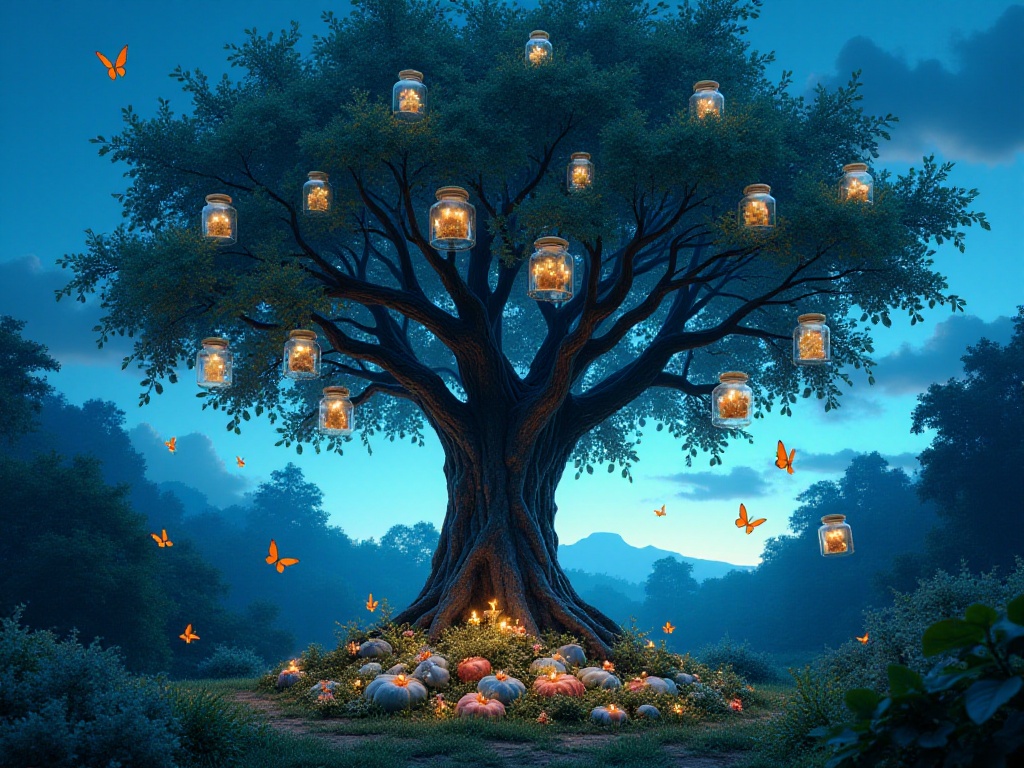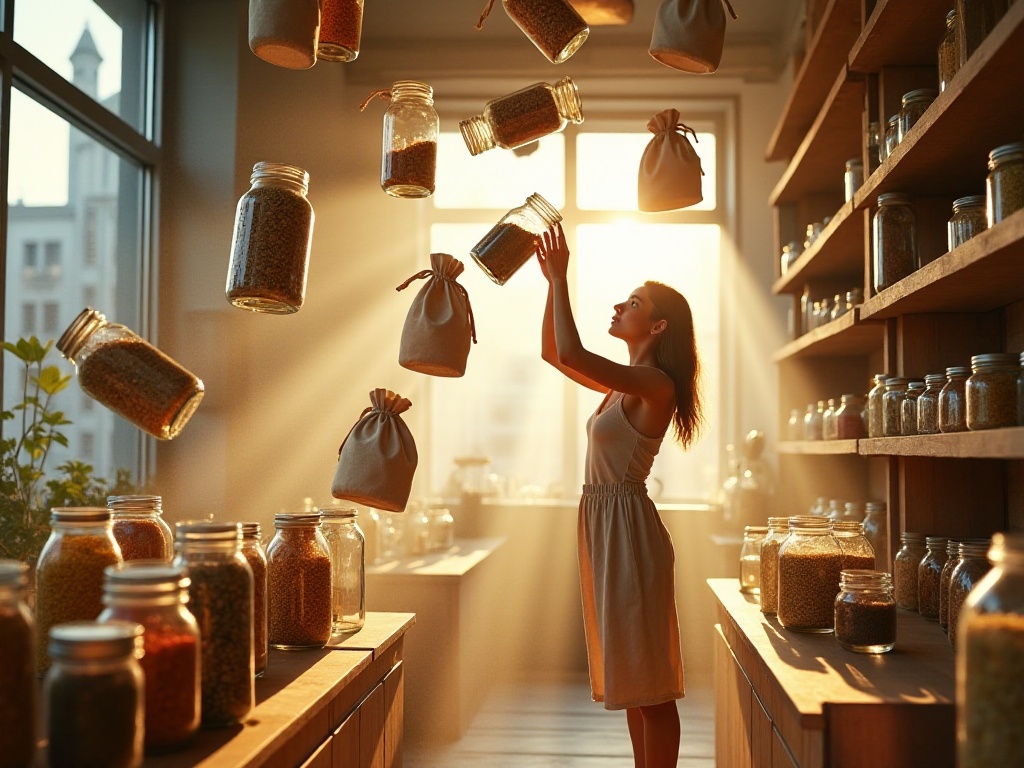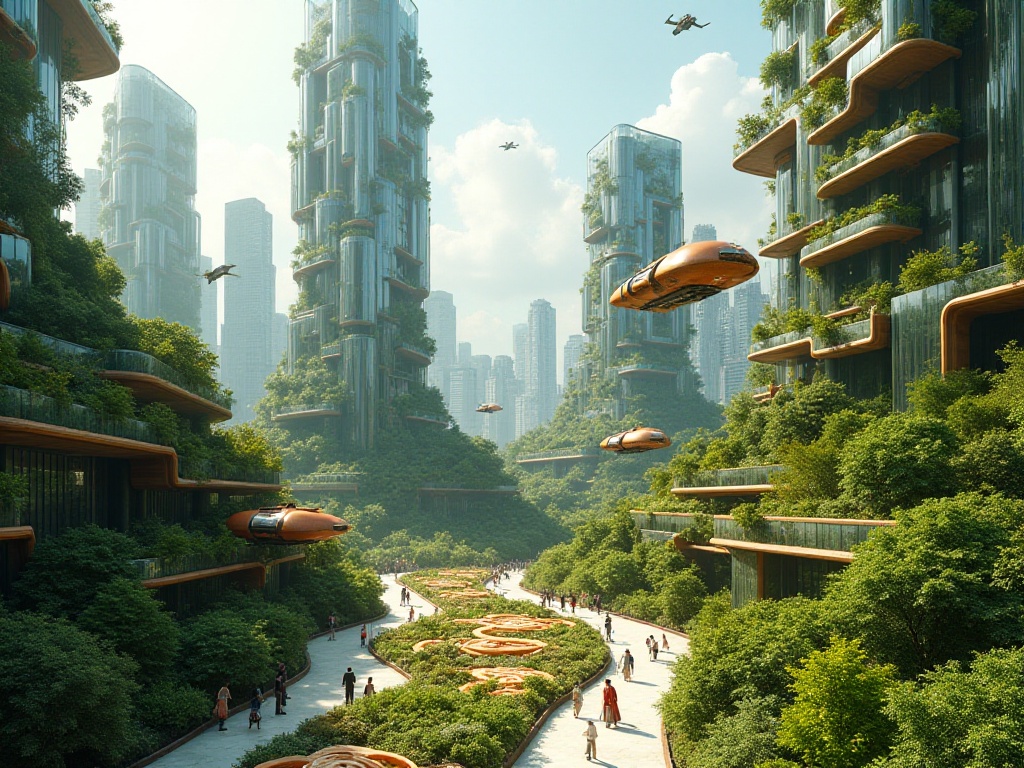The Beginning
A few days ago, while browsing through my phone's photo gallery, I was shocked by a photo - it showed delivery boxes piled up in my balcony corner. Just one month of online shopping had created a "cardboard mountain." This made me wonder: as an ordinary urban young person, how much waste was I unconsciously generating?
After looking up some environmental organization data, I was even more shocked. It turns out that urban residents like me produce an average of 440kg of household waste per year! What does this mean? It's roughly equivalent to 300 full garbage bags. If all this waste were piled up in my 60-square-meter apartment, there wouldn't even be room for a bed.
This number kept me up at night. While we all worry about environmental issues, we continue to generate waste in our daily lives. Thinking about this, I decided to do something to make a change. So, I set myself a challenge: a 21-day zero-waste living experiment.
To be honest, my initial motivation came from a very everyday scene. Every day after work, I would see the community garbage bins piled up like small mountains, with exposed waste emitting unpleasant odors. What's more heartbreaking was seeing how much of this waste could have been avoided: unfinished takeout, intact packaging boxes, almost new items... These scenes kept bothering me until three weeks ago, when I finally decided to change my lifestyle.
Preparation
To make this experiment more convincing, I spent a week recording my waste output. Every evening, I would carefully count the day's waste and document it with photos. This process was eye-opening - I never realized how much unnecessary waste filled my life.
Take food delivery for example. As an urban professional who doesn't like cooking, I relied on takeout for almost every meal. In a week, just the delivery containers alone filled two extra-large garbage bags. Plastic containers, disposable chopsticks, condiment packets, plastic bags... these packaging materials were used for less than half an hour before I thoughtlessly tossed them in the trash.
Besides takeout, courier packaging was another shocking number. During shopping festivals like Double 11 and 618, I couldn't resist the urge to shop. As a result, my storage room was filled with various delivery boxes, bubble wrap, and plastic packaging bags. Most ironically, some online purchases weren't even unpackaged before being forgotten in a corner.
To better understand my waste composition, I began detailed classification statistics. I divided all waste into four categories: plastic packaging, kitchen waste, paper packaging, and miscellaneous items. The statistics showed that plastic packaging accounted for 40%, including various food packaging, courier packaging, and shopping bags. Kitchen waste was 30%, mainly leftover food, expired ingredients, and various fruit peels and vegetable leaves. Paper packaging was 20%, including delivery boxes, product manuals, and advertising flyers. The remaining 10% was miscellaneous items, including used batteries, broken small appliances, and expired cosmetics.
These data made me realize how environmentally unfriendly my consumption habits were. Every casually discarded plastic bag, every disposable takeout container used once and thrown away, was adding to Earth's burden. More importantly, a considerable portion of this waste could have been avoided.

The Five-Step Rule
After extensive reading and research, I discovered a well-established zero-waste living philosophy from abroad called the "5R Principle." These five Rs represent five levels of waste management, arranged in order of importance. I decided to use this principle to guide my zero-waste life.
The first R is Refuse. This is the most fundamental step - learning to say "no" to unnecessary items. For instance, I now always carry a canvas bag and reusable water bottle. When shopping at convenience stores, I politely decline when clerks habitually offer plastic bags, saying: "No bag needed, thank you." Though it's just a small plastic bag, if everyone did this, the reduction in waste would be amazing.
Beyond shopping bags, I've learned to refuse various promotional gifts and disposable items. At coffee shops, I actively present my thermos instead of accepting their disposable cups. At supermarkets, I avoid over-packaged goods. These small "refusals" add up to significant effects.
The second R is Reduce. This requires us to rethink our consumption habits and only buy what we truly need. I used to be an impulsive shopper, often tempted by marketing campaigns to buy things I didn't need. Now, before buying anything, I ask myself three questions: Do I really need this? Do I already have something similar? How long will this item last?
Through this self-questioning, I discovered that 80% of my previous shopping was avoidable. Those stockpiled skincare products, clothes worn only once, small appliances gathering dust - all evidence of waste. Now I spend money more wisely, preferring to buy one quality product that lasts for years rather than multiple cheap items that get thrown away quickly.
The third R is Reuse. This requires creativity to maximize items' utility. Now, my most popular storage containers are various cleaned glass jars. Jam jars, coffee containers, pickle jars - all have found new uses. They store ingredients, serve as vases or pencil holders, and even preserve lemon slices.
Old clothes have found new purposes too. Unwearable cotton clothes become cleaning rags, old sweaters can be unraveled and reknitted, and outdated clothes can be transformed into other items. I even fold old newspapers into paper bags for collecting recyclables. This creative reuse not only saves money and helps the environment but also adds a vintage charm to life.
The fourth R is Recycle. This demands strict waste sorting habits. At first, I often confused which waste went in which bin. I downloaded a waste sorting guide on my phone and put detailed instructions in my home's waste sorting area.
After some practice, I was surprised to find that 90% of household waste is actually recyclable. Glass bottles, cans, cardboard boxes, plastic bottles - these seeming "wastes" are actually reusable resources. I've even established contact with nearby recycling stations, regularly selling recyclables to them - both environmentally friendly and earning some pocket money.
The last R is Rot, letting organic waste return to nature's cycle. I set up a small compost bin on my balcony specifically for kitchen waste. Fruit peels, tea leaves, coffee grounds, eggshells - all can go in for fermentation. After about three months, this kitchen waste becomes rich organic soil.
My plants are now growing especially well, thanks to this homemade organic fertilizer. Most touching is that kitchen waste, which I used to find smelly, can now become life-nurturing nutrients - isn't this nature's most wonderful cycle?

Life Transformation
Kitchen Revolution
The biggest change in this zero-waste experiment happened in the kitchen. I used to be a loyal food delivery app user, with my trash bin always full of takeout containers. Now, I'm learning to cook, starting with simple stir-fried vegetables and gradually mastering quite a few signature dishes.
Every weekend, I prepare next week's shopping list and bring various reusable containers to the farmers' market. Cloth bags for vegetables, glass jars for beans, stainless steel boxes for tofu... Though it seemed troublesome at first, this shopping method now feels quite ceremonial.
To avoid wasting ingredients, I plan weekly menus based on food shelf life. Vegetables and bean sprouts that spoil easily are scheduled for the first two days after purchase. Potatoes, carrots, and pumpkins that store well are saved for weekends. When cooking, I prepare portions based on actual appetite, aiming to finish everything. Even leftovers are incorporated into the next day's meals.
I've learned tricks to prevent ingredients from spoiling. For example, washing and drying vegetables before storing them in preservation bags in the refrigerator helps them last longer. Bananas and apples are stored separately as they affect each other's ripening speed. I've set up an "expiring soon" section in the fridge to remind myself to use these ingredients first.
Through these changes, I've not only greatly reduced kitchen waste but also discovered the joy of cooking. Most importantly, homemade meals are healthier and allow control over ingredient freshness and taste, eliminating concerns about takeout hygiene.

Personal Care Transformation
In personal care, I've also made a series of changes. First was replacing plastic toothbrushes. You might not know that a regular plastic toothbrush takes 500 years to fully decompose, and we change them every three months on average. Now I use bamboo toothbrushes, which can go straight into the compost bin after use - both eco-friendly and practical.
Shampoo and shower gel were replaced with solid soaps. Initially, solid soap seemed less convenient and less foamy than liquid products. But after using them for a while, I found solid soaps work great. They're preservative-free, gentler on scalp and skin, last much longer, and generate no plastic packaging waste.
I'm more careful with skincare product choices too. I used to be tempted by new products, leading to many expiring before use. Now I prioritize products with simple formulations and recyclable packaging, and only buy new ones after finishing the old.
I switched to reusable menstrual cups for sanitary protection. Though it took some getting used to, they're much more comfortable than traditional pads and greatly reduce sanitary waste.

Unexpected Gains
These 21 days of zero-waste living brought many unexpected benefits. First was financial savings. Previously, I spent thousands just on takeout monthly. Now cooking at home, I eat healthier and my monthly food expenses have halved. Combined with reduced unnecessary shopping, I save at least 1000 yuan monthly.
More important are the psychological gains. Without being burdened by various items, I feel unprecedented lightness. My room is neat and orderly, no longer filled with unused things. Opening my wardrobe, I see only my favorite, most-worn clothes, eliminating choice paralysis.
I've discovered that a simple lifestyle brings more creativity and happiness. Making meals from scratch, watching ingredients become delicious dishes; repurposing old items, experiencing the satisfaction of creativity; growing flowers and vegetables on the balcony, feeling life's wonder... These are beautiful experiences I missed in my previous fast-paced life.
Zero-waste living doesn't mean living like an ascetic, but learning to consume and live more wisely. It teaches us to cherish everything we have and rethink what we truly need.
So, would you like to try zero-waste living? Start with one small habit change. Maybe carry a canvas bag, cook dinner yourself, or just sort waste carefully. Gradually, you'll find this lifestyle isn't just environmentally friendly but liberating.
After all, life's most beautiful things are often the simplest. When we learn to live with less, we gain more happiness and freedom. Isn't this the lifestyle we've been seeking?


